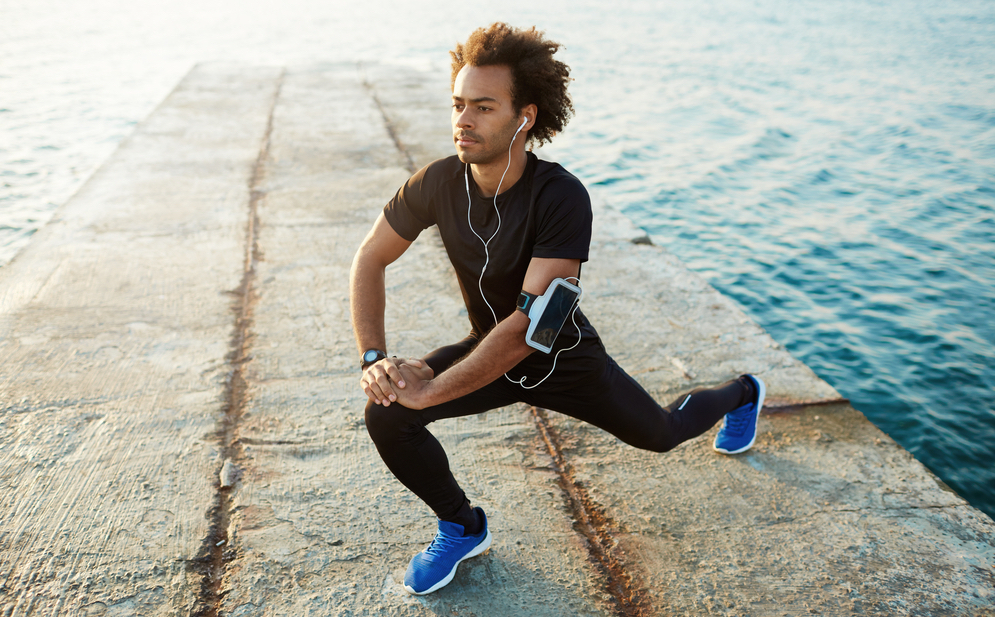
Seth Gamradt, MD, an orthopedic surgeon who specializes in sports medicine at Keck Medicine of USC, shares some key factors to consider and plan for the day of the race, so you can focus on reaching the finish line.
You’ve trained for months running the streets of the city, but few runners train on the race course itself, and it’s difficult to simulate race conditions prior to the event.
Here are 10 tips to help you improve your experience.
1. Logistics
Know and double-check your plan for parking. Also, calculate your travel to and from the race start and finish lines. Don’t let traffic before the race compromise all of your hard work and training. Lastly, give yourself enough time to warm up and stretch to ensure a good start.
2. Fuel
It’s critical to fuel your body before the race. Eat high carbohydrate meals (80% of intake) for several days prior to the race to build up your store of glycogen, a crucial energy source for your body. On the morning of the race try to eat a 500- to 800-calorie breakfast two to three hours before the race. Limit fiber to avoid gastrointestinal upset. Predictability is key: Eating foods you know worked well during your long training runs is critical for a calm stomach and high energy on the day of the race.
3. Shoes
It seems obvious, but on the day of the race it’s best to avoid changes in equipment, especially shoes. Wearing your tried-and-true running shoes will help to prevent the foot pain and blistering that are common in long-distance running.
4. Hydration
Before the race, pay attention to urine color — aim for light yellow as a sign of adequate hydration. Although sweat rates vary from runner to runner, a good guideline for hydration is six to eight ounces of fluid every 20 minutes. Avoid over hydrating, which can lead to stomach upset. Make sure your race-day hydration consists of energy drinks containing carbohydrates and electrolytes and water. Consuming water alone during the race can lead to hyponatremia, which is caused by dilution of the blood’s sodium level and can be very dangerous.
5. Energy gels/bars
Commercially available prepackaged carbohydrate sources are an important fuel source in triathlon and distance running. Again, familiarity is key to avoid race-day stomach upset, so stick with energy snacks you’ve consumed during your training. Consume one snack 45 to 60 minutes (with water) after the race starts and every 45 to 60 minutes thereafter.
6. Lubrication/skin protection
Lubricate sensitive areas with products designed to prevent chafing and blisters. Believe it or not, severe blistering or chafing can end your race prematurely. For sun protection, apply sports sunscreen that protects against UVB and UVA rays at least 30 minutes before running, and consider wearing sun protective clothing made specifically for running.
7. Pace
The adrenaline of the race start may lead to the possibility of starting too fast. Begin your pace near or slower than your typical training pace to avoid flaming out late in the race.
8. Temperature
There can be a significant temperature increase during the race from cool at the start to warm (even hot) at the finish. Pay attention to race-day weather forecasts and consider layering your clothing to accommodate temperature fluctuations. Most importantly, wear what has been comfortable for you on long training runs.
9. Pain
On the day of the race, you may experience pain, soreness, muscle ache and fatigue from training. If you typically take non-steroidal anti-inflammatory drugs (NSAIDs) or acetaminophen before training runs, don’t change this on the day of the marathon. However, if you haven’t been using these over-the-counter medications, the day of the race is probably not the time to experiment.
10. Danger signs
As mentioned, some soreness is expected on race day. However, if you begin to experience sharp pain with each step, swelling in a joint, escalating pain anywhere in your body or you begin to limp, it’s not advisable to push through these types of symptoms and finish the race. In addition, confusion, light-headedness, chest pain and shortness of breath can all be signs of a significant medical issue. You should seek medical attention immediately if you experience these symptoms.
Completing a race is an important goal you have set for yourself. Make sure you do things on race day that support the training you’ve done up to this point, and you’ll have the best opportunity to hit the finish line feeling like a winner.
Topics
